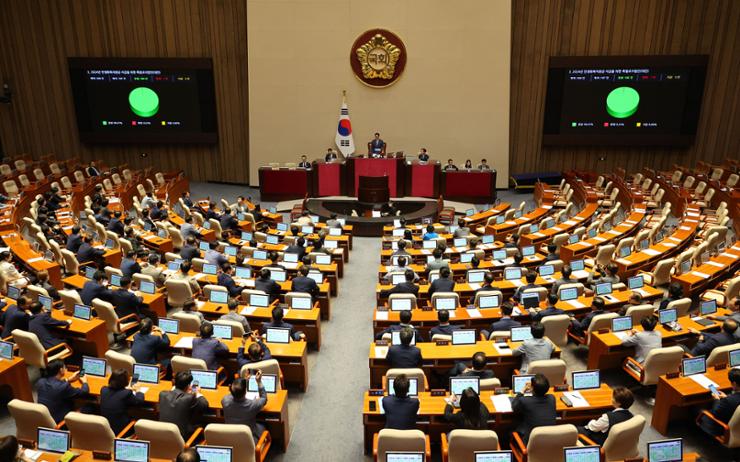WEB DESK: The National Assembly passed the controversial cash handout bill during the parliament’s plenary session Friday. The bill stipulates that every Korean citizen, as well as qualified foreign residents of Korea, would receive at least 250,000 won ($180) worth of cash vouchers to support the recovery of people’s livelihoods.
Since National Assembly Speaker Woo Won-shik accepted the main opposition Democratic Party of Korea (DPK)’s unilateral request to table the legislation a day earlier, the ruling People Power Party (PPP) immediately responded with a 24-hour filibuster in protest.
The filibuster, which began Thursday afternoon, continued for 24 hours and 5 minutes until around 3 p.m. Friday, yet it was put to an end by the opposition-controlled parliament. Under the National Assembly Act, a filibuster can be stopped after 24 hours if at least three-fifths, or 180 lawmakers, consent to it.
The cash handout bill was then put to a vote and passed the National Assembly with 186 of the 187 lawmakers present at the session voting in its favor. There was only one vote against the bill.
While Rep. Lee Jun-seok of the Reform Party, former PPP chair, cast the only dissenting vote to the bill, PPP lawmakers left the plenary session in protest.
The cash handout proposal was among the top agenda items of the main opposition DPK as the 22nd National Assembly opened in May. Former party leader Lee Jae-myung has argued that the plan of providing cash vouchers worth 250,000 to 350,000 won per person — which should be used within four months — could boost spending and revive the local economy.
Regarding the bill’s passage, the presidential office criticized it as unconstitutional and populist.
Speaking with reporters at the presidential office in Seoul on Friday, a senior official emphasized that the cash handout bill violates the constitutional principle of separation of powers.
“The authority to draw up the national budget belongs to the government, according to the Constitution. Thus, the legislature’s attempt to mandate the executive’s budget through law is unconstitutional, as it goes against the constitutional principle of separation of powers,” the official said.
The official was referring to Article 57 of Korea’s Constitution, which states that “the National Assembly shall, without the consent of the executive, neither increase the sum of any item of expenditure nor create any new items of expenditure in the budget submitted by the executive.”
The presidential office further denounced the bill for its ineffectiveness.
“In addition to being unconstitutional, the bill’s impact is minimal compared to its 13 trillion won cost,” the official added.
This perspective is echoed within the ruling conservative party.
The party’s lawmakers pointed out that the main opposition DPK is infringing on the executive branch’s exclusive right to budget formulation, criticizing it for being mired in populism.
They argued that the opposition, leveraging its numerical superiority, is attempting to exercise all powers within the National Assembly to incapacitate the government.


